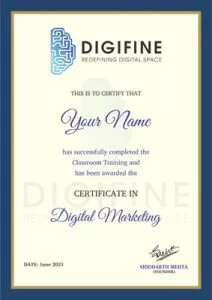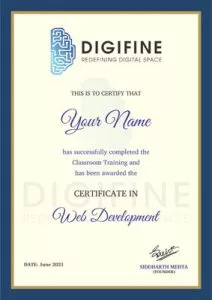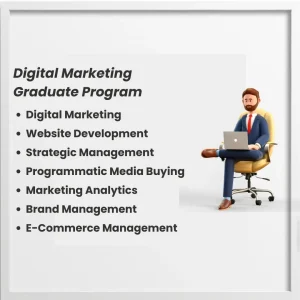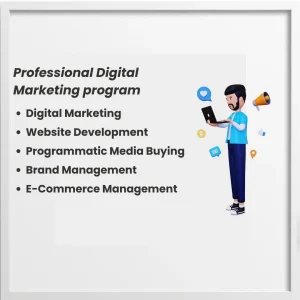EXECUTIVE DIGITAL MARKETING COURSE FOR BEGINNERS
BEST DIGITAL MARKETING COURSE IN ANDHERI,MUMBAI FOR BEGINNERS
- Internationally Recognized
- 80% Practical and 20% Theoretical Training
- Comprehensive Modules
- Highly Experienced Faculty
- Industry Exposure

Executive Digital Marketing Course in andheri, mumbai For Beginners
Add a dynamic flair to your professional portfolio with the best short course in digital marketing. Master relevant skills and stand out in the industry with professional certifications. Gain valuable insights and global exposure through a practically driven digital marketing course for beginners.
Executive Digital Marketing Course in Andheri, Mumbai for Beginners Modules
- Introduction
- Understanding digital marketing platforms
- Why digital marketing?
- Difference between digital marketing & traditional marketing
Learning Keyword Research and Media Planning, creating Display Ads, Remarketing campaigns, and understanding Shopping Network.
- Search Network
- Display Network
- Video Network
- App Network Ads
- Shopping Ads
- Remarketing/Conversion
Understanding major Social Media channels, Social Media best practices and techniques for optimizing Social Media handles.
- Facebook Marketing
- Instagram Marketing
- LinkedIn Marketing
- Twitter Marketing
- Snapchat Marketing
- Social Media Optimization
Understanding usage of Email as a promotional tool for a business, learning to set up and use best industry tools and creating professional campaigns.
- Setting up Mailchimp account
- Generating an audience
- Creating mail campaigns
- Testing and designing
- Reporting
Learning influence of a positive reputation on a business, how to manage a business’s reputation online and best practices for maximum consumer engagement
- Overview of Online Reputation Management
- Platforms to manage ORM
- Case studies
- Tools used
- Assignments
Learning SEO best practices based on latest industry and technological requirements, understanding organic search and significance of search engine page rankings.
- How search engines work
- Keyword Research
- Search console/Webmasters
- On-Page SEO
- Off-Page SEO
Measuring and tracking advertising campaigns across Google Inventory and implementing best practices with the help of insights gained.
- Google Analytics Setup
- Google Analytics Interface
- Measuring campaigns
- Tracking campaigns
- Reporting
Understanding significance of Landing Pages, Landing Page creation and management, Landing Pages best practices for capturing leads.
- Introduction to Landing Page
- Do’s and Don’ts of Landing Page Creation
- Building a Landing Page which converts
- Landing Page Funnel
Influencer Marketing overview and best strategies to improve engagement on social media platforms and boost conversions through Influencer partnerships.
- How to map right influencer
- How to connect with influencers
- Brand collaboration briefing
- Influencer marketing campaign
- Influencer marketing reporting
Understanding significance of Mobile Marketing, creating effective campaigns, best practices to capture maximum consumers through Mobile Ads, tracking and analyzing campaigns.
- Mobile Marketing ads on social media and Google Ads
- Tracking mobile marketing performance
- Mobile marketing campaign activation
- Mobile marketing reporting
Learning to create structured and professional websites using the most used industry software, setting up and customizing websites, using plugins and effective techniques to engage and capture consumers.
- Understanding Domain Name and Domain Hosting
- WordPress Setup
- Theme customization
- Plugins
- WooCommerce Setup
- Creating Landing Pages
- Order Management System
Learning HTML codes for creating and structuring websites, learning CSS, best HTML practices for Search Engine Optimization.
- Getting started with Visual Studio
- HTML Format
- HTML Tags
- CSS
- Linking HTML with CSS
- Creating a HTML website
- Hosting the website
Using WhatsApp as a tool for marketing, best WhatsApp Marketing strategies, techniques for WhatsApp Marketing
- Importance of WhatsApp Marketing
- Tools required for WhatsApp Marketing
- Sending WhatsApp messages in bulk
- WhatsApp Marketing Reporting System
Learning the importance of content marketing as an advertising strategy , types of content a business can create, understanding and implementing content psychology optimum practices.
- Understanding difference between content marketing and Ad scripting
- Writing psychology
- Layout psychology
- Layout writing
- Storytelling technique
Placement Post Digital Marketing Beginners Course in Andheri, Mumbai
Why choose Digifine for a Digital Marketing Course for beginners?
If you’re looking to upskill and learn digital marketing course in Andheri, Mumbai right from the basics, then Digifine is the right place for you. We have the best short course in digital marketing wherein you will be trained by industry experts from a practical approach. Not only will you be trained in the top industry tools and techniques, but you will also receive several professional certifications, a 100% placement and post-course support. Equip yourself with the most relevant skills and boost your career prospects with Digifine’s digital marketing course for beginners.
Premium
Institute of
learning
Industry Recognized
Courses
Top Technologies
and tools
Certified
Industry
Trainers
Live projects for hands-on experience
Versatile
timings for
batches
Professional & International
Certificates
Supportive
environment
for learning
Mock Interviews & Recruitment training
Career
guidance and
mentoring
100%
placement
assistance
Post
Placement
Support
Digital Marketing Course in Andheri, Mumbai For Beginners Key Features

Digifine, the prominent digital marketing institute in Mumbai, offers its Executive Digital Marketing Course in Andheri to learners looking to acquire mastery over primary digital marketing and website development skills in a short duration of time. It is ideal for students who want to learn application-based digital marketing and get ahead in their careers.
- Covers Digital Marketing and Website Development
- 50+ hours of live class
- 5 certifications
- One-on-one mentoring
- Industry tools mastery
- 100% placement assistance
- Post course support
Who should do this course?
Digifine Executive Digital Marketing Course is the best Digital Marketing Course in Andheri, Mumbai for learners looking to acquire mastery over primary digital marketing and website development skills in a short duration of time. It is ideal for students who want to learn application based digital marketing

How Do I Make a Career in Digital Marketing Field?
With the availability of good internet services across the country and the resources it offers, you can easily enrol in high-quality digital marketing courses online. Professional certifications, industry-specific programs along with executive digital marketing course sets you apart from the rest. Industry-recognized certifications and other qualifications assure employers that you have the appropriate skills and in-depth knowledge required to be a successful digital marketer. With the advent of the metaverse, 5G, and other cutting-edge technologies, there is going to be a tremendous demand for digital marketers in the future. The space for digital marketing professionals is growing at a lightning pace but the supply is still limited. This shortfall offers a great opportunity for you to create a successful career in this industry.
Five things you can do right now to start your digital marketing journey:
- Learn about the latest trends
- Network with people
- Research important digital marketing skills and focus on one to start with
- Create an online presence for yourself
- Enroll for a recognized digital marketing certification

Digifine Executive Digital Marketing Course in Andheri, Certificates


Digifine Executive Digital Marketing Course in Andheri, Student Reviews
Shreya Soni
Digital Marketing Manager, Adbizit
Talvinder Singh
Digital Marketing Associate, Group M
Darshil Doshi
Paid Media Specialist, Group M
Kashish Raghani
Creative Head, Adbizit
Pooja Shrimal
Sr. Media Planner, Tonic Worldwide
Nisha Vishwakarma
Programmatic Analytics, Publicis Groupe, Andheri
Register for the Executive Digital Marketing Course in Andheri
Take a step forward into the Digital Marketing Industry with Digifine
FAQs
You do not require any prior knowledge of digital marketing to enroll in our executive digital marketing course in Andheri and related programs. Anyone who has an interest in the digital field can join our courses and certifications and make a career in it.
Digifine Academy’s executive digital marketing course in Andheri and related programs in Mumbai are 100% practical courses. Here students get to work on live projects, ad campaigns, and web projects to get in-depth practical knowledge and be industry-ready on course completion.
We work with industry professionals, collaborate, and have valuable connections with HR departments of several companies, active in the digital marketing area. Along with these, we provide resume building, soft skills training, interview masterclass, and scheduling that ensure 100% placement assistance to our students post the completion of the course. We offer thorough training which guarantees the chances of our students getting hired.
We work with industry professionals and have collaborations with HRs from several companies, where students are placed post the completion of the course. We offer thorough training which guarantees the chances of our students getting hired.
Digital marketing is not at all difficult to learn and practice. With good guidance and training, anyone who is passionate about Digital Marketing can master it. At Digifine, the top digital marketing institute in Mumbai, we emphasize practical training coupled with a strategic approach to digital marketing, which thoroughly prepares our students for the challenges and opportunities of the industry.
No, it’s a certification course recognized by industry standards. Digifine also provides Google Certification for digital marketing. Some of the important components taught in the course are social media marketing, search engine marketing, email marketing, videos, etc.
Yes absolutely! In today’s scenario, businesses are focused on driving business exponentially through digital channels. Digital marketing is the marketing of today and the future and is here to stay, so the confidence in digital marketing is strong. If you are planning to improve your marketing career, you should definitely learn digital marketing, as it is going to be more in demand in the future, compared to traditional marketing.
The faculty of Digifine, the top digital marketing institute in Mumbai, are industry professionals with years of experience in the digital marketing field. They have worked with market leaders and helped many brands to grow their business digitally. Our faculty is up to date with new trends in digital marketing. The students they train get practical, relevant, and up-to-date knowledge of the digital marketing industry.
Digifine Academy’s executive digital marketing course in Andheri is specifically designed for students looking to learn application-based digital marketing. Along with in-depth practical training in digital marketing, the course also offers training in 20+ industry tools and HTML, CSS, and E-Commerce based website development. These are the in-demand skills for a successful international digital marketing career today. This course equips you with the advanced digital media marketing skills that will propel your career forward and also offers a 100% internship and a placement guarantee.
The eligibility for the executive digital marketing program from Digifine Academy is 10+2/Graduation.
The executive digital marketing course from Digifine Academy is of the duration of 3 months with 108+ hours of live classroom training.
Digifine, the top digital marketing institute in Mumbai, offers the best digital marketing courses with a 100% placement guarantee. Our courses are globally recognized and cover all facets of digital marketing. Our Industry Advisory Panel consists of renowned experts who have worked with some of the world’s most influential brands and companies. We offer guaranteed internships and placements with industry-leading digital marketing firms and organizations all over India. We also provide all-time post-course support to our students even after completion of the course. We train our students to become the best in their field and surge in their careers ahead. And this is why we are considered the top digital marketing institute in Mumbai.
Salient Features of Digifine Digital Marketing Course in Andheri, Mumbai For Beginners
Digifine Academy’s Executive Digital Marketing Course in Andheri, Mumbai offers training on 20+ digital marketing tools used in the industry along with HTML, CSS, and E-Commerce based website development. This Digital Marketing Certification is ideal for students looking to learn application-based digital marketing. Taught by industry experts and experienced professionals, it covers Google Ads, Mobile Marketing, Social Media Marketing, and Search Engine Optimization. It also covers E-Commerce, HTML/CSS-based website development, WhatsApp, and content marketing along with other aspects of digital marketing.
Best Digital Marketing Institute in Mumbai, Andheri
Digifine, the prominent digital marketing institute in Mumbai, offers the best digital marketing course in Andheri with a 100% placement guarantee. Our courses are globally recognized and cover all facets of digital marketing. Our Industry Advisory Panel consists of renowned experts who have worked with some of the world’s most influential brands and companies. We offer guaranteed internships and placements with industry-leading digital marketing firms and organizations all over India. We also provide all-time post-course support to our students even after completion of the course. We train our students to become the best in their field and surge in their careers ahead.
Course Syllabus
The course syllabus of Digifine Academy’s executive digital marketing course in Andheri consists of in-depth digital marketing knowledge combined with practical industry experience. The course consists of 14 modules that are 80% practical and 20% theory. Along with application-based digital marketing, our students get trained in 20+ industry tools and HTML, CSS, and E-Commerce based website development. This helps our students get lucrative overseas placements and get ahead in their digital marketing careers.












